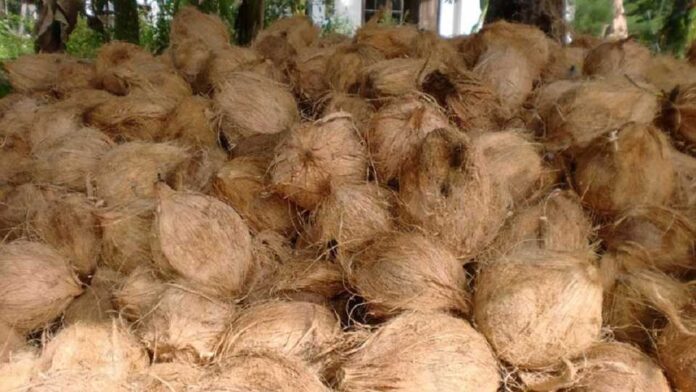By: Staff Writer
January 23, Colombo (LNW): The Ceylon Chamber of Coconut Industries (CCCI) has called for urgent government intervention to address a severe coconut shortage threatening both domestic consumption and the country’s export potential.
Highlighting escalating fertilizer costs, pest infestations, land fragmentation, and climate change as key factors limiting coconut cultivation, CCCI President Jayantha B. Samarakoon has proposed immediate measures to mitigate the crisis.
At a recent media briefing, Samarakoon emphasized the need to import 200 million coconuts over the next few months to bridge the gap in domestic and industrial demand.
He cited skyrocketing fertilizer prices as the primary reason behind the production slump, noting that costs have risen from Rs. 1,500 to Rs. 12,000 per 50 kg bag. This price surge has discouraged growers, with fertilizer usage among farmers dropping to less than 10%.
Sri Lanka’s monthly coconut demand is 250 million nuts, with 150 million consumed domestically and 100 million used in industrial production.
However, annual coconut yields have declined sharply, dropping from 3 billion nuts to 2.68 billion in 2024. The Coconut Research Institute predicts further declines in 2025, with a shortfall of 200 million coconuts anticipated between January and April.
This deficit, exacerbated by extreme weather conditions and a growing pest population, has resulted in soaring coconut prices and disrupted raw material supplies for export manufacturers.
The CCCI has outlined several measures to address the crisis:
Short-Term Imports: Permit the importation of raw materials such as dried coconut kernels, copra chips, and coconut milk to stabilize the supply chain.
Subsidized Fertilizer: Reduce fertilizer prices to Rs. 4,000 per bag to encourage usage and improve yields.
Water and Soil Subsidies: Provide support for water supply and soil conservation to sustain cultivation.
Consumer Awareness: Promote processed coconut products, such as coconut milk powder and desiccated coconut, to reduce demand for fresh coconuts.
Samarakoon also stressed the importance of minimizing household coconut waste, which currently accounts for 20-25% of domestic consumption. A 10% reduction could release 200 million coconuts annually for industrial use, generating an estimated $160 million in foreign exchange.
Despite the challenges, Sri Lanka’s coconut export industry has shown resilience. Coconut product exports generated $782 million by November 2024, marking a 20% year-on-year increase.
Annual revenue is expected to reach $850 million in 2025, the highest ever recorded. With global demand for coconut-based products projected at $27-30 billion annually, driven by the rise in vegan and plant-based diets, Sri Lanka has significant growth potential.
The CCCI has set an ambitious target of achieving $1.5 billion in export revenue by 2027, requiring an annual production of 4.5 billion coconuts. To reach this goal, the Chamber has proposed allocating Rs. 1.5 billion from the CESS Fund to support moisture conservation, pest control, replanting, and infrastructure development.
Samarakoon concluded by urging the government to prioritize the coconut industry in its economic agenda, emphasizing the sector’s contribution to livelihoods and export revenue. With collaborative efforts and immediate action, Sri Lanka can overcome its current challenges and secure a sustainable future for the coconut industry.

